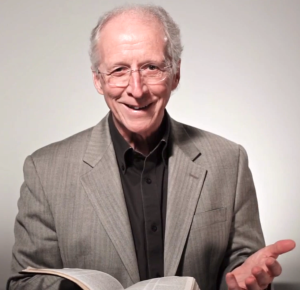 “The king’s heart is a stream of water in the hand of the LORD; he turns it wherever he will.” – Prov. 21:1
“The king’s heart is a stream of water in the hand of the LORD; he turns it wherever he will.” – Prov. 21:1
“If Yahweh is sovereign over the greatest human will, He is sovereign over all human wills.” – Dan Phillips

In this brief clip from his teaching series Knowing Christ, R.C. Sproul explains why we can’t choose God, even though we have free will.
Transcript
I was interviewed yesterday for a series of programs that were being presented about Reformed theology, and the person who was running this program asked me what the basic issue was between Augustinian theology or Reformed theology and historic semi-Pelagianism. I said I think it comes down to a different understanding of freedom and of free will. I think the principle problem that people have with divine sovereignty with divine election is immediately they say ‘Well, we believe that man has free will.’ Well, I don’t know any Augustinian in all of church history who didn’t strongly affirm that we have free will. We are volitional creatures. God has given us minds and hearts, and He’s given us wills. And we exercise that will all the time. We make choices every minute of the day, and we choose what we want. We choose freely. Nobody’s coercing us, putting a gun to our head—we’re not robots. Robots don’t have minds. Robots don’t have wills. Robots don’t have hearts. We’re human beings. We make choices. That’s why we’re in trouble with God because the choices that we make in our fallen condition are sinful choices. We choose according to our desires which are only wicked continuously the Bible tells us. That we are as it were, dead in sin and trespasses even though biologically we’re very much alive, and we’re walking according to the course of this world—according to the Prince of the power of the air—fulfilling the lusts of the flesh is what the Bible tells us.
And so, the Bible makes it very clear that we are actively involved in making choices for which we are responsible and which expose us to the judgment of God. And yet at the same time, the Bible teaches us that we’re enslaved. We’re free from coercion, but we don’t have what Augustine called “royal liberty.” We are not free from ourselves. We’re not free from our own sinful inclinations, and our sinful appetites, and our sinful desires. We’re slaves to our sinful impulses. That’s what the Bible teaches us again, and again, and again. The humanist doctrine of free will, the pagan view of free will says that man is free not only from coercion, but man is free in the sense that his will is indifferent. It has no predisposition, or inclination, bias, or bent towards sin because the pagan and the humanist deny the radical character of the fall. But the Bible teaches us that we are fallen creatures who still choose and make decisions, but we make them in the context of our prison of sin. And the only way we can get out of that prison is if God sets us free.
 A Beginner’s Guide to ‘Free Will’ – Article by John Piper (original source man was sinless and able not to sin. For God “saw everything that he had made, and behold, it was very good” (Genesis 1:31). But he was also able to sin. For God had said, “In the day that you eat of it [the tree] you shall surely die” (Genesis 2:17).
A Beginner’s Guide to ‘Free Will’ – Article by John Piper (original source man was sinless and able not to sin. For God “saw everything that he had made, and behold, it was very good” (Genesis 1:31). But he was also able to sin. For God had said, “In the day that you eat of it [the tree] you shall surely die” (Genesis 2:17).
As soon as Adam fell into sin, human nature was profoundly altered. Now man was not able not to sin. In the fall, human nature lost its freedom not to sin.
Why is man not able not to sin? Because on this side of the fall “that which is born of the flesh is flesh” (John 3:6), and “the mind of the flesh is hostile to God, for it does not submit to God’s law; indeed, it cannot, and those who are in the flesh cannot please God” (Romans 8:7–8, my translation). Or, as Paul says in 1 Corinthians 2:14, “The natural person does not accept the things of the Spirit of God, for they are folly to him, and he is not able to understand them because they are spiritually discerned.”
Notice the word cannot twice in Romans 8:7–8, and the words “is not able” in 1 Corinthians 2:14. This is the nature of all human beings when we are born — what Paul calls the “natural person,” and what Jesus calls “born of the flesh.”
Too Rebellious to Submit to God
This means, Paul says, that in this condition we “cannot please God,” or, to put it another way, “we are not able not to sin.” The basic reason is that the natural person prefers his own autonomy and his own glory above the sovereignty and glory of God. This is what Paul means when he says, “The mind of the flesh is hostile to God, for it does not submit . . . ”
Glad submission to God’s authority, and to God’s superior value and beauty, is something we are not able to do. This is not because we are kept from doing what we prefer to do. It is because we prefer our own authority, and treasure our own value, above God’s. We cannot prefer God as supremely valuable while preferring ourselves supremely. Continue reading